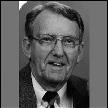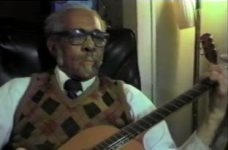The Lives and Times of Extraordinary Athenians: Jack Thornton and Morgan “Bucky” Redwine
The 1994 Athens-Clarke County Library Heritage Room Oral History Project “Rendezvous with Destiny” features interviews from World War II Veterans of Athens, as well as people who helped in the war effort. One exciting aspect of this project is discovering that many of the interviewees played pivotal roles in whatever community they were apart of- be it on the battlefield or in Athens. In this series of blog posts, we’ll take a closer look at the individuals interviewed in this collection.


Robert “Jack” Thornton and Morgan “Bucky” Redwine were two Air Force lieutenants from the Athens area. Although both of these men were deployed in Hiroshima at the same time during their service, they did not befriend each other until after the war when they both worked in real estate. During their service, the pair flew single engine P-51 planes to escort and protect large B-29 bomber planes. Both gentlemen recall their planes being very small; the cockpit had about the same amount of space provided by a desk chair. This was a shocking experience for both Jack and Bucky since neither one of them had even been on an airplane prior to the war.
Jack enlisted in the Air Force in 1942. He completed his advanced training in Jackson, Mississippi in 1944. His class in Jackson was the first class of Americans to complete training on his particular base since only Dutch pilots were trained in Jackson prior to the arrival of Jack's class. In the interview, Jack chuckles as he remembers the Dutch pilots as stiff competition in meeting the local girls. In spring of 1945, he arrived in Hiroshima where he flew four missions. On Jack's fourth flight, June 19, 1945, he crashed his plane on take-off and burned over 50% of his body. After at a brief stay in a field hospital in Japan, Thornton was transferred to a large general army hospital in Gaum. He returned to the U.S. before the atom bomb was dropped on Hiroshima in 1945.
Bucky's entrance into the war was somewhat different than Jack's. When the war broke out, Bucky was attending the Virginia Military Institute. He enlisted in the Air Force in 1942 because he was told that if one enlisted early, the Air Force would allow one to finish college before being called to serve. He was disappointed to find this was only a "malicious rumor". He completed his training in Dothan, Alabama and was sent to Japan in 1944. Although Bucky was serving in Hiroshima during the dropping of the atom bomb, the event had no large impact on him since he had to continue his service after the matter. In the interview, he laments not going to the surrender ceremony since it became such a historically significant event.
One topic of interest that the two men laughed about together was Tokyo Rose. Tokyo Rose was a radio program that broadcasted Japanese propaganda. The host of the show was an English-speaking woman who attempted to break Allied Soldiers' moral. However, Bucky and Jack remember that all their fellow soldiers simply laughed and made jokes at the show. Bucky interjected saying how the program even "played pretty good music."
After the war, both men lived in Athens, where they met their future wives. Because he resided in the Athens area for virtually all his life, Jack joked that he doesn't even remember meeting his wife, Ruth Thornton. Together they had five children. He found his career and passion in real estate. He was able to further foster his dedication to real estate when he was a charter member and first president of the Athens Board of Relators and a charter member and first secretary of the Athens Area Association of Real Estate Appraisers.
Bucky and his wife, Karen Redwine, had two children. He held a wide range of business jobs in Athens, which included establishing Redwine Real Estate and Insurance and serving as the vice president of the Athens Federal Bank and Trust. An energetic community leader, he served on the Athens-Clarke County Schoolboard, as President of the Friends of the Georgia Museum, and in many other community outreach groups. Bucky even wrote a weekly column in the Athens Observer, showing what a highly regarded citizen he was.
Since both men lived around Athens all their lives, their interview provides unique insight into what daily life in Athens was like many decades ago. For example, Jack explained how Alps Road received its name: According to Jack, the road was originally a dirt path, where teenagers loved to drive their cars over the hills. When they went to drive over the hills, the teenagers said they were driving in the Alps, and the name has since stuck. At this point in the interview, Bucky nods along as if he heard this explanation time and time again.
Jack Thornton died July 21, 2008, at the age of 85, and Bucky Redwine died November 5, 2013 at the age of 89. Their obituaries can be found here and here.
Although Jack and Bucky did not meet until after the war, the pair was able to reminisce over their time in both Asia and Athens as if they had been together through it all. There were even points in the interview when Jack would add to Bucky's story and vice versa, highlighting information that they left out. Their interview is a true testament to friendship built on shared stories and experiences.
You can learn more about Bucky and Jack's experiences by listening to their interview, which is available on YouTube.



 Joe Kinney Rakestraw, a self-taught Athens folk musician, had been married to his wife Alberta a little over a month when the Japanese attacked Pearl Harbor in 1941. He was drafted shortly thereafter in June of 1942, and was sent to Casablanca, Morocco once he completed his training. In his interview, Joe, chuckling to himself, recalls battle ships firing outside the ship he arrived on as if they were practicing for combat. Later he realized this was not target practice as he initially thought, but an actual attack on his ship.
Joe Kinney Rakestraw, a self-taught Athens folk musician, had been married to his wife Alberta a little over a month when the Japanese attacked Pearl Harbor in 1941. He was drafted shortly thereafter in June of 1942, and was sent to Casablanca, Morocco once he completed his training. In his interview, Joe, chuckling to himself, recalls battle ships firing outside the ship he arrived on as if they were practicing for combat. Later he realized this was not target practice as he initially thought, but an actual attack on his ship.






